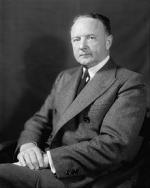Disable ads!
Harry F. Byrd
This article includes a list of references, but its sources remain unclear because it has insufficient inline citations. Please help to improve this article by introducing more precise citations. (February 2013) Harry F. Byrd United States Senator from Virginia In office March 4, 1933 – November 10, 1965 Preceded by Claude A. Swanson Succeeded by Harry F. Byrd, Jr. 50th Governor of Virginia In office February 1, 1926 – January 15, 1930 Lieutenant Junius Edgar West Preceded by Elbert Lee Trinkle Succeeded by John Garland Pollard Member of the Virginia Senate from the 26th district In office January 9, 1924 – February 1, 1926 Preceded by J. M. Dickerson Succeeded by Joseph S. Denny Member of the Virginia Senate from the 10th district In office January 12, 1916 – January 9, 1924 Preceded by Frank S. Tavenner Succeeded by Marshall B. Booker Personal details Born Harry Flood Byrd (1887-06-10)June 10, 1887 Martinsburg, West Virginia, U.S. Died October 20, 1966(1966-10-20) (aged 79) Berryville, Virginia, U.S. Political party Democratic Spouse(s) Anne Douglas Beverley Children Harry, Jr. Bradshaw Richard Beverley Religion Episcopalian Harry Flood Byrd, Sr. (June 10, 1887 – October 20, 1966) of Berryville in Clarke County, Virginia, was an American newspaper publisher, farmer and politician. He was a descendant of one of the First Families of Virginia. His ancestors included William Byrd II of Westover Plantation, who established Richmond, Robert "King" Carter of Corotoman, a colonial governor, and Pocahontas, and he was the brother of famed aviator Richard E. Byrd. He was the father of Harry F. Byrd, Jr., who succeeded him as U.S. Senator. Byrd was a dominant figure in Virginia who reorganized and modernized Virginia's government. His political machine dominated Virginia Democratic Party politics for much of the first half of the 20th century. He was elected the 50th Governor of Virginia in 1925 and continued to lead a political faction that became known as the Byrd Organization as he represented Virginia as a United States Senator from 1933 until 1965. Financial conditions in Virginia during his youth conditioned his thinking on fiscal matters throughout his life. He is best remembered for his austere "pay-as-you-go" financial policies. Byrd was also known as a racist and avowed white supremacist. Byrd was vehemently opposed to racial desegregation of the public schools, and as such advocated a policy of "massive resistance" that led to closure of some public school systems in Virginia between 1959 and 1964. This policy created a large subset of black students who were denied their education in several Virginia counties. These students, many of whom are still alive, are known as the "lost generation."
 Read more on wikipedia.org Read more on wikipedia.org
 All quotes by Harry F. Byrd All quotes by Harry F. Byrd
 Edit Edit
|

|
|
|
|
|
Background photo by Giuliana
|